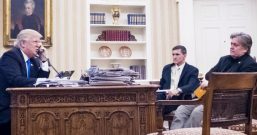One of the thinkers Steve Bannon says he admires, Julius Evola, despised the United States and everything it stood for.
Gorsuch Nomination: Potentially the Best News for Originalism since 1987
With his nomination of Judge Neil Gorsuch President Trump may have done more for originalism than any President since Ronald Reagan. Unfortunately, a few days later, he called into question his own commitment to the rule of law by calling an Article III judge a “so-called judge.” The juxtaposition of the excellent and the reckless continues what I have argued is the essential pattern of his Presidency: He makes appointments (except in the trade area) that on balance advance classical liberalism and limited government, but makes remarks that are foolish with the potential to undermine much of the good his appointments will do.
First, the good news: Gorsuch is a fine nomination, a worthy successor to Justice Scalia in the three ways that count. First, he is an originalist. That matters, because the last two Republican appointees, Chief Justice John Roberts and Justice Samuel Alito, have not shown themselves to be either declared or relatively consistent originalists. And it is originalism tha holds the most promise for maintaining a beneficent Constitution and a constrained judiciary.
Second, as I argued at the City Journal, Gorsuch is a superb writer. To be powerful and influential with the public, as Scalia was, a justice needs to convey his ideas clearly and pungently. Justice Clarence Thomas, for all his other fine qualities as justice, is not as good as Scalia was at this task. Gorsuch is in the top 2 percent of all federal judges in this ability.
Third, to be influential with academics, justices must be at home in the world of legal scholarship and theory. Gorsuch has himself written an excellent university press book on assisted suicide. His opinions often engage with the latest law review articles as well as the latest case law on a subject. This academic breadth matters more than one might think. Even if the Supreme Court makes correct decisions today, they will last only if our constutional culture becomes an originalist culture, as it was for the century before progressivism. Originalism has been ascending in academic respectability for the last two decades, in no small part thanks to Antonin Scalia. Another justice who takes the academic case for originalism seriously will provide fuel for continued ascent.
And Gorsuch’s openness to legal scholarship will create a better dialectic between the Court and the academy. That kind of exchange transformed antitrust law. With an appointment or two more like that Gorsuch, it could change constitutional law.
But President Trump’s incautious comments endanger the happy prospects created by his very sound nomination. Perhaps the latest one was just clumsy way of expressing disagreement with the ruling rather than attacking the legitimacy of a judge. But his opponents will exploit their ambiguity. They will depress his popular support and make it harder to confirm Gorsuch and future appointees. Silence is an underrated political virtue.
